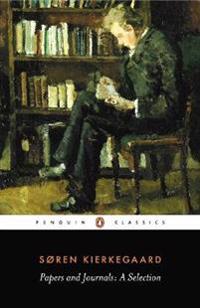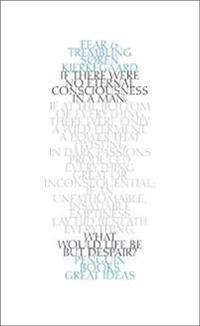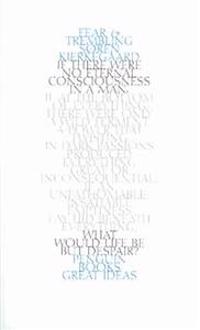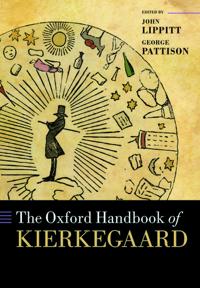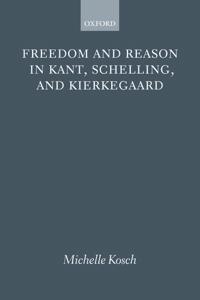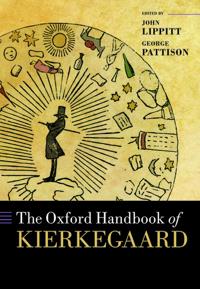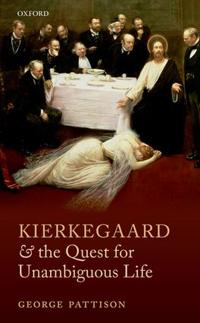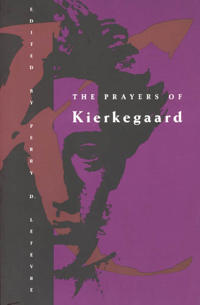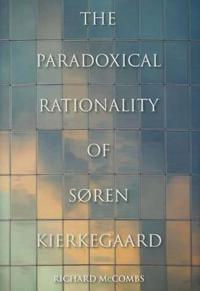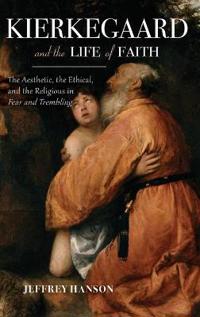Papers and Journals (Storpocket)
avSoren Kierkegaard
ISBN: 9780140445893 - UTGIVEN: 199603One of the greatest thinkers of the nineteenth century, Soren Kierkegaard (1814-55) often expressed himself through pseudonyms and disguises. Taken from his personal writings, these private reflections reveal the development of his own thought and personality, from his time as a young student to the[...]
Fear and Trembling (Pocket)
avSoren Kierkegaard
ISBN: 9780141023939 - UTGIVEN: 200508Throughout history, some books have changed the world. They have transformed the way we see ourselves - and each other. They have inspired debate, dissent, war and revolution. They have enlightened, outraged, provoked and comforted. They have enriched lives - and destroyed them. Now Penguin brings y[...]
The Seducer's Diary (Pocket)
avSoren Kierkegaard
ISBN: 9780141032818 - UTGIVEN: 200708Johannes is an aesthete, dedicated to creating the possibility of seduction through the careful manipulation of young women. He stealthily pursues the innocent Cordelia until she becomes increasingly drawn to him. But when she is ready to give herself completely, she realizes she may have got everyt[...]
The Sickness Unto Death (Pocket)
avSoren Kierkegaard
ISBN: 9780141036656 - UTGIVEN: 200808Influencing philosophers such as Sartre and Camus, and still strikingly modern in its psychological insights, Kierkegaard's "The Sickness Unto Death" explores the concept of 'despair' as a symptom of the human condition and describes man's struggle to fill the spiritual void. Throughout history, som[...]
Fear and Trembling (Häftad)
avSoren Kierkegaard
ISBN: 9780143037576 - UTGIVEN: 200605
The perfect books for the true book lover, Penguin's Great Ideas series features twelve more groundbreaking works by some of history's most prodigious thinkers. Each volume is beautifully packaged with a unique type-driven design that highlights the bookmaker's art. Offering great literature in[...]Kierkegaard (Häftad)
avPatrick Gardiner
ISBN: 9780192802569 - UTGIVEN: 200202Soren Kierkegaard (1813-55), one of the most original thinkers of the nineteenth century, wrote widely on religious, psychological, and literary themes. This book shows how Kierkegaard developed his views in emphatic opposition to prevailing opinions. It describes his reaction to the ethical and rel[...]
Love's Grateful Striving: A Commentary on Kierkegaard's "Works of Love" (Inbunden)
avM.Jamie Ferreira
ISBN: 9780195130256 - UTGIVEN: 2001-06-21The Oxford Handbook of Kierkegaard (Pocket)
avJohn Lippitt, George Pattison, John Lippitt
ISBN: 9780198709794 - UTGIVEN: 2015-03The Oxford Handbook of Kierkegaard brings together some of the most distinguished contemporary contributors to Kierkegaard research together with some of the more gifted younger commentators on Kierkegaard's work. There is significant input from scholars based in Copenhagen's Soren Kierkegaard Resea[...]
Soren Kierkegaard
ISBN: 9780198747703 - UTGIVEN: 2015-12Soren Kierkegaard: Subjectivity, Irony, and the Crisis of Modernity examines the thought of Soren Kierkegaard, a unique figure, who has inspired, provoked, fascinated, and irritated people ever since he walked the streets of Copenhagen. At the end of his life, Kierkegaard said that the only model he[...]
Soren Kierkegaard
ISBN: 9780198785224 - UTGIVEN: 2018-03The book takes as its starting point the statement made by Kierkegaard towards the end of his life in which he claimed the model for his work had always been Socrates, and traces this influence on Kierkegaard's development as philosopher and religious thinker with a particular focus on the early tex[...]
Kierkegaard's Ethic of Love: Divine Commands and Moral Obligations (Pocket)
avC. Stephen Evans
ISBN: 9780199206049 - UTGIVEN: 2006-07-27Kierkegaard
ISBN: 9780199208364 - UTGIVEN: 2009-01Soren Kierkegaard (1813-1855) was first and foremost a Christian thinker who is perhaps best known for his devastating attack upon Christendom or the established order of his time. Not since Luther has there been a Protestant thinker who has so uncompromisingly sought to define and present Christian[...]
Repetition and Philosophical Crumbs (Pocket)
avSoren Kierkegaard
ISBN: 9780199214198 - UTGIVEN: 2009-05-14These two complementary works give the reader a unique insight into the breadth and substance of Kierkegaard's thought. One reads like a novel and the other a Platonic dialogue but both concern the nature of love, faith, and happiness. These are the first translations to convey the literary quality[...]
Inheritance and Originality: Wittgenstein, Heidegger, Kierkegaard (Inbunden)
avStephen Mulhall
ISBN: 9780199243907 - UTGIVEN: 2001-06-14God of Metaphysics, The: Being a Study of the Metaphysics and Religious Doctrines of Spinoza, Hegel, Kierkegaard, T H Green, Bernard Bosanquet, Josiah Royce, A N Whitehead, Charles Hartshorne and Concluding with a Defence of Pantheistic Idealism (Inbunden)
avT. L. S. Sprigge
ISBN: 9780199283040 - UTGIVEN: 2006-04-20Freedom and Reason in Kant, Schelling, and Kierkegaard
ISBN: 9780199577941 - UTGIVEN: 2010-03Michelle Kosch's book traces a complex of issues surrounding moral agency - how is moral responsibility consistent with the possibility of theoretical explanation? is moral agency essentially rational agency? can autonomy be the foundation of ethics? - from Kant through Schelling to Kierkegaard. The[...]
The Oxford Handbook of Kierkegaard (Inbunden)
ISBN: 9780199601301 - UTGIVEN: 201301The Oxford Handbook of Kierkegaard brings together some of the most distinguished contemporary contributors to Kierkegaard research together with some of the more gifted younger commentators on Kierkegaard's work. There is significant input from scholars based in Copenhagen's Soren Kierkegaard Rese[...]
Kierkegaard: Exposition & Critique (Inbunden)
avDaphne Hampson
ISBN: 9780199673230 - UTGIVEN: 2013-04-25A clear introduction to the major works of Kierkegaard that highlights the Lutheran framework of Kierkegaard's thought, and combines exposition of the philosophical, theological, and historical context of his works with an engaging critical dialogue that brings Kierkegaard into debate with twenty-fi[...]
Kierkegaard and the Quest for Unambiguous Life (Inbunden)
avGeorge Pattison
ISBN: 9780199698677 - UTGIVEN: 201303This book looks at Kierkegaard with a fresh perspective shaped by the history of ideas, framed by the terms romanticism and modernism. 'Modernism' here refers to the kind of intellectual and literary modernism associated with Georg Brandes, and such later nineteenth and early twentieth century figur[...]
The Prayers (Häftad)
avSoren Kierkegaard
ISBN: 9780226470573 - UTGIVEN: 1996-06Soren Kierkegaard's influence has been felt in many areas of human thought from theology to psychology. Nearly 100 of his prayers are gathered here, illuminating his own life of prayer and speaking to the concerns of Christians today. The second part of the volume is a reinterpret ation of the life [...]
Kierkegaard and Japanese Thought
ISBN: 9780230552838 - UTGIVEN: 2008-06Kierkegaard knew nothing of Japanese philosophy yet the links between his own ideas and Japanese philosophers are remarkable. The book examines Kierkegaard in terms of Shinto, Pure Land Buddhism, Zen Buddhism, the Samurai, the famous Kyoto school of Japanese philosophers, and in terms of pivotal Jap[...]
The Paradoxical Rationality of Soren Kierkegaard (Inbunden)
avRichard Phillip McCombs
ISBN: 9780253006479 - UTGIVEN: 201304Soren Kierkegaard deliberately feigned irrationality in many of his pseudonymous writings in order to present a rational argument about reason and faith. Richard McCombs posits that Kierkegaard's strategy of revealing the philosophical and religious underpinnings of his thought was both instructive [...]
Kierkegaard and the Life of Faith
ISBN: 9780253024701 - UTGIVEN: 2017-01Soren Kierkegaard's Fear and Trembling is one of the most widely read works of Continental philosophy and the philosophy of religion. While several commentaries and critical editions exist, Jeffrey Hanson offers a distinctive approach to this crucial text. Hanson gives equal weight and attention to [...]

